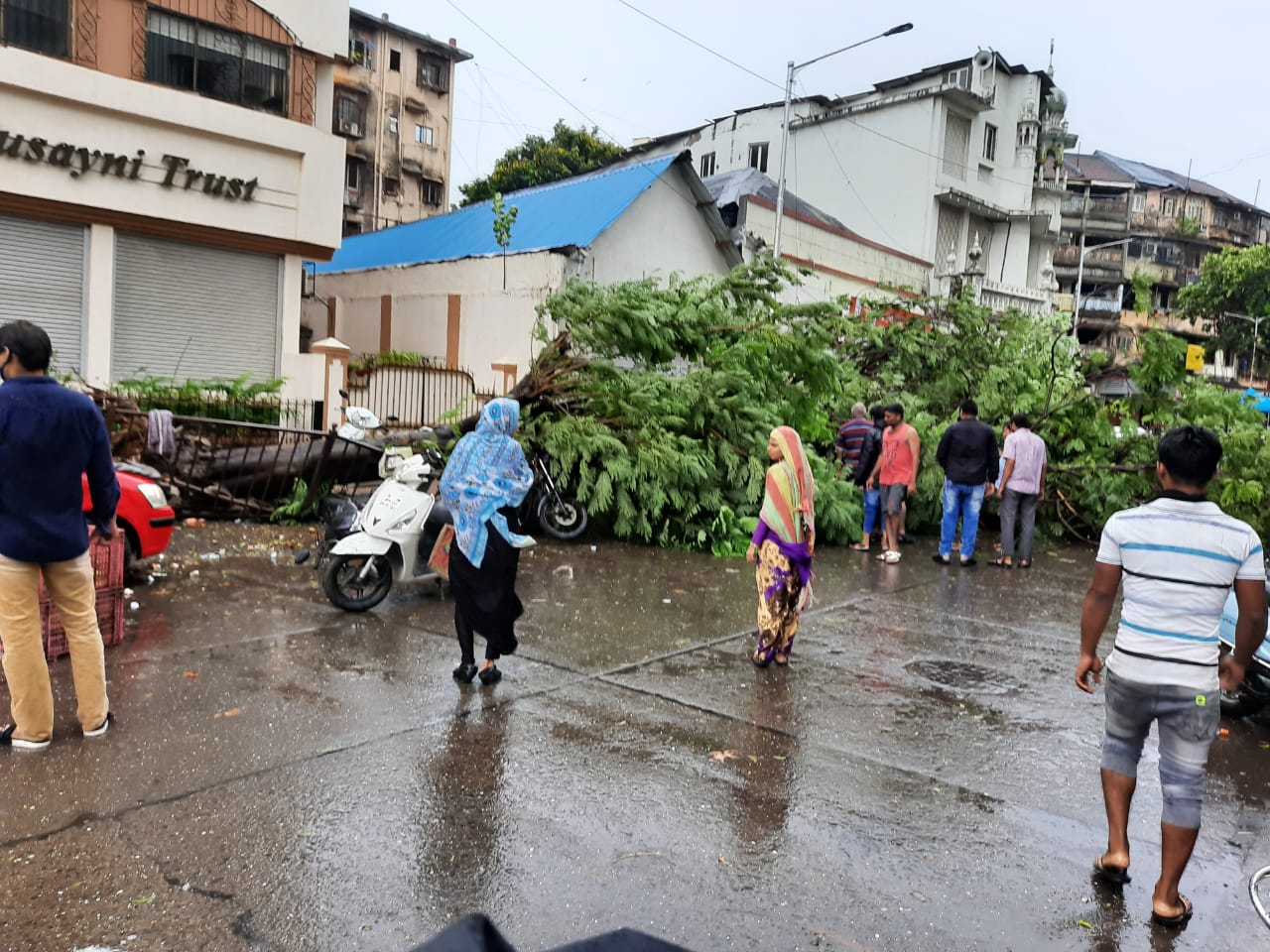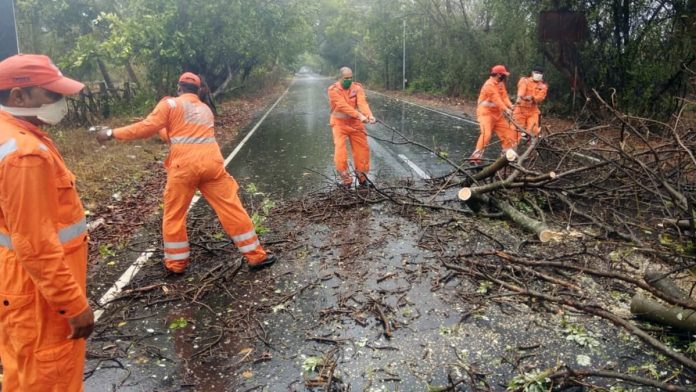 English
English

Cyclone Nisarga made landfall near Mumbai on Wednesday but spared the city already reeling under the COVID-19 pandemic, even as it uprooted trees in nearby Raigad and Palghar districts.

Mumbai: Cyclone Nisarga made landfall near Mumbai on Wednesday but spared the city already reeling under the COVID-19 pandemic, even as it uprooted trees in nearby Raigad and Palghar districts.
A 58-year-old man died after a power transformer fell on him while he was rushing home to escape the cyclone fury at Umate village in Raigad district, police said.
Two people died and three were injured in two separate cyclone-related incidents in Pune district, an official said.
The cyclone slammed Maharashtra coast with wind speeds of up to 120 kmph, making landfall at 12.30 PM at Alibaug in Raigad district near Mumbai. The process was completed by 2.30 PM, a senior IMD official said.
Cyclone Nisarga is expected to weaken into a deep depression within the next six hours and currently it lays centered over Pune in Maharashtra, the official said.
Mumbaikars and people in neighbouring areas, including those in coastal Gujarat districts had braced for the cyclone but heaved a sigh of relief as Nisarga's damage appeared limited to uprooting of trees in affected areas.
Ahead of Nisarga's landfall, thousands of people in its path were evacuated, trains rescheduled, flights cancelled, fishermen ordered out of the seas and rescue workers were put on standby.
Already down on its knees from the raging COVID-19 pandemic, this was the first major cyclone Mumbai would have faced in 72 years, according to Adam Sobel, a professor of atmospheric science at Columbia University in New York.
Nisarga blew in from the Arabian Sea, making landfall at the coastal town Alibaug.
Also Read: Cyclone- Rains cause water-logging in Pune
Steeped in colonial history, Alibaug is a quaint little town located about 110 km from Mumbai, and is dotted with sandy beaches, several forts and temples. A speedboat from Mumbai to Mandwa jetty near Alibaug takes 20 minutes.
Nisarga came a week after Cyclone Amphan wreaked havoc in West Bengal.
The IMD had said kuccha houses, trees, electric poles may fall as they may not be able to withstand the speed of the storm. However, as the cyclone weakened into a depression, it was clear that the extent of damage was far lesser than anticipated.
Pune-based Sucheta Nadkarny, 81, who lived in suburban Vile Parle during the last major cyclone to hit Mumbai in 1948 said, "I remember huge trees in our area were uprooted and plants in our garden destroyed.
"I was 10 years old then and remember this because my mother was heartbroken as the plants she had lovingly nurtured were destroyed," Nadkarny told.

Ahead of Nisarga's landfall, the state government authorities had asked people in vulnerable areas to shift to safer places.
The Central Railway (CR) rescheduled special trains and many airlines also cancelled their Mumbai operations.
Flight operations at the Mumbai airport, suspended at 2.30 pm, resumed in the evening, a spokesperson of GVK said.
Maharashtra and Gujarat had activated their disaster response mechanism, deploying NDRF teams and evacuating people from areas in the cyclone's path.
Authorities in Gujarat had shifted over 63,700 people living close to the coast in eight districts to safer places as a precautionary measure, an official said.
All fishing boats which were out in the sea off Palghar coast in Maharashtra returned before the landfall, an official said.
Also Read: Cyclone Nisarga shows signs of weakening
As many as 577 fishing boats from Palghar had gone out in the sea and till Monday evening, 564 came back. Later, help was sought from the Coast Guard, Navy and the fisheries department and the remaining 13 boats also returned to the shore late Tuesday evening.
The threat posed by Nisarga to Mumbai has lessened, but the next few hours will be crucial, Maharashtra Revenue Minister Balasaheb Thorat said.
Authorities in Pune, Nashik and Ahmednagar are on alert considering the trajectory of the cyclone, he said.
"Though the threat posed to Mumbai by the cyclone has reduced, the next few hours will be quite crucial. The cyclone can have influence over an average of 200 km from its eye," the minister tweeted.

Ahead of the cyclone landfall, carnivorous animals in Mumbai zoo were shifted to holding areas in their enclosures to keep them safe from rain and strong winds, an official said.
Since the city has been experiencing rain, authorities at the Veermata Jijabai Udyan, also popularly known as Byculla Zoo which is spread over an area of 50 acres, took all steps to protect the animals against the rough weather, he said.
Tigers, leopards and hyenas were shifted to holding areas, an official from the Brihanmumbai Municipal Corporation (BMC) said. (PTI)